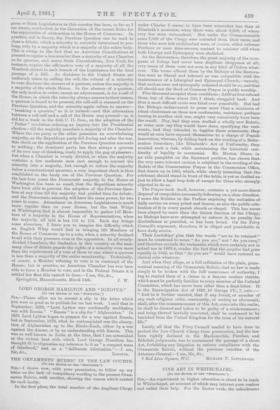THE ORNAMENTS RUBRIC IN THE LAW COURTS.
[To THE EDITOR OF THE " SPROTATOR.1
Srn,—I desire now, with your permission, to follow up my letter on the lack of compulsory wording in the present Orna- ments Rubric, with another, showing the reason which existed for such laxity.
In the first place, the total number of the Anglican Clergy under Charles I. seems to have been somewhat less than at Elizabeth's accession, when there were about 9,500, of whom very few were unbeneficed. But under the Commonwealth some 7,000 of the Clergy were extruded from their cures, and those who were left undisturbed were, of .course, either extreme Puritans or mere time-servers, content to minister still when both Liturgy and Episcopacy were abolished.
At the Restoration, therefore, the great majority of the occu- pants of livings had never been Anglican clergymen at all; very many of them were not even in any kind of Orders what- ever. The terms offered them by the Bishops at the Restora- tion were as liberal and tolerant as was compatible with the maintenance of a Liturgical and Episcopal Church,—namely, that such as were not episcopally ordained should be so, and that all should use the Book of Common Prayer in public worship. Five thousand accepted these conditions ; 2,000 at first refused them, but of these about 500, I think, straggled back. And thus a most difficult crisis was tided over peaoefully. But had the Bishops endeavoured to press more than a minimum of ritual observance on these new conformists, resistance, perhaps issuing in another civil war, might very conceivably have been the result. Nay, had they even drafted a wholly new Rubric, as some now say they would have done, specifying the vest- ments, had they intended to legalise those ornaments, they would at once have exposed themselves to a charge of Popish innovation, whereas, by falling back on the wording of a Refor- mation formulary, like Elizabeth's Act of Uniformity, they avoided such a risk, while maintaining the historical con- tinuity of legality in ceremonial. Mr. Morton Shore, in an able pamphlet on the Eastward position, has shown that the very same tolerant caution is exhjbited in the wording of the Rubric of the Consecration Prayer in the Communion Office, first drawn up in 1661, which, while clearly intending that the celebrant should stand in front of the table, is yet so drafted as just to allow a legal loop-hole of escape for those who strongly objected to do so.
The Prayer-book itself, however, contains a yet more direct disproof of compulsion necessarily following on a clear direction. I mean the Rubrics in the Preface enjoining the recitation of daily service on every priest and deacon, as also the public cele- bration of it iu every parish church or chapel. This has never been ebeyed by more than the tiniest fraction of the Clergy, no Bishops have ever attempted to enforce it, no penalty for disobedience is provided, or has been levied. On the Privy Council's argument, therefore, it is illegal and punishable to have daily service.
Their Lordships' plea that the words " are to be retained " must be construed to mean " As you arc," not " As you were," and therefore exclude the vestments, which were certainly not in actual use in 1663-4, evades the fact that the surplice had gone equally in 1643, so that " As you are " would have restored no clerical robe whatever.
And when they allege, as a full refutation of the plain, gram- matical meaning of the Ornaments Rubric, that no law is made simply to be broken with the full connivance of authority, I beg to remind them of a clause in a famous modern statute, which must be perfectly familiar to every member of the Judicial Committee, which has never been other than a dead-letter. It is the Emancipation Act of 1829, 10 George IV., 7, xxix. :— " And be it further enacted,Ahat if any Jesuit, or member of any such religious order, community, or society as aforsesaid, shall, after the commencement of this Act, conic into this realm, he shall be deemed and taken to be guilty of a misdemeanour; and being thereof lawfully convicted, shall be sentenced to be banished from the United Kingdom for the term of his natural life."
Lastly, all that the Privy Council needed to have done to protect the Low-Church Clergy from prosecution, had the law been rightly declared in the Mackonochie, Purchas, and Ridsdale judgments, was to recommend the passage of a short Act, forbidding any litigation to enforce compliance with the Ornaments Rubric, without the previous sanction oh the Attorney-General.—I am, Sir, &c.,
































 Previous page
Previous page